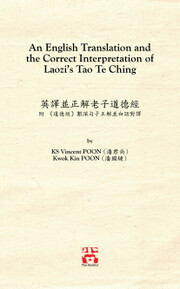Tao Te Ching
道德經
Background information
Tao Te Ching (《道德經》, or Dao De Jing), presumably written by Laozi (老子) of the 6th century BC, is one of the most famous and influential philosophical works in Chinese history. Written in fewer than 6000 Chinese characters, Tao Te Ching outlines the characteristics and roles of the fundamental Tao (道) and its Te (德, Manifestation of Tao) in the formation and maintenance of all in the Universe. Remarkably, it also depicts the underlying nature of governance and some natural laws, which, surprisingly, include modern scientific concepts such as atomic theory, chemical equilibrium, polarities, and the quantum uncertainty principle.
Unfortunately, Tao Te Ching is often misinterpreted by many for more than two thousand years. Their failures are mainly attributed to applying Taoist Religion (道教), Huang-Lao (黄老), and Confucian concepts in interpreting characters such as “鬼”, “神”, “仁”, “慈”, “善”, and “德”. Further, “若”, “似”, and “或” are also frequently misinterpreted, giving rise to the incorrect impression that Laozi was a scheming and calculating philosopher. Prominent interpreters of the past and present, including Heshang Gong (河上公), Wang Bi (王弼), Gao Heng (高亨), and James Legge, have all committed these types of errors in varying degrees.
This book provides readers with an annotated, line-by-line, concise, consistent, and correct English translation and interpretation of Tao Te Ching. Accompanied 674 footnotes include references and brief discussions on general misunderstandings. Further, to facilitate easy reading, the bare translated text is supplemented in a separate section, while the correct interpretation of difficult and complex sentences in vernacular Chinese (《道德經》艱深句子正解並白話對譯) in another. Accordingly, this book is perfect for anyone interested in Chinese philosophy.
Original Chinese Text
(Wang Bi's 王弼 Edition)
English Interpretation
by KS Vincent Poon (潘君尚) and Kwok Kin Poon (潘國鍵)
第七十八章 Chapter 78
____
209. 天下莫柔弱於水,而攻堅強者莫之能勝,其無以易之。
There is nothing under Heaven gentler and weaker than water, yet there is nothing better than (勝) it to attack (攻) the mighty and strong (堅強); therefore (以), in this respect (其), nothing can replace (易) it.
210. 弱之勝強,柔之勝剛,天下莫不知,莫能行。
The weak is better than (勝) the strong, and the gentle is better than the bold (剛). Everyone under Heaven knows this, but no one can carry it out in practice.
211. 是以聖人云:受國之垢,是謂社稷主;受國不祥,是謂天下王。正言若反。
第七十九章 Chapter 79
212. 和大怨,必有餘怨;安可以為善?是以聖人執左契,而不責於人。
213. 有德司契,無德司徹。天道無親,常與善人。
第八十章 Chapter 80
214. 小國寡民。使有什伯之器而不用;使民重死而不遠徙。雖有舟輿,無所乘之,雖有甲兵,無所陳之。
215. 使民復結繩而用之,甘其食,美其服,安其居,樂其俗。
216. 鄰國相望,雞犬之聲相聞,民至老死,不相往來。
第八十一章 Chapter 81
217. 信言不美,美言不信。善者不辯,辯者不善。知者不博,博者不知。
218. 聖人不積,既以為人己愈有,既以與人己愈多。
219. 天之道,利而不害;聖人之道,為而不爭。
Thus, the wise sages once said, “A person who can accept (受) all the shame (垢) of a state can be called the master of the state (社稷); a person who can accept (受) all the misdeeds (不祥) of a state can be called the leader of all under the Heaven.” Proper narratives (正言) of Tao are (若) countering ways to restore (反) all back to Tao.
FOR FURTHER TRANSLATION, FOOTNOTES, AND ELABORATIONS
PLEASE SEE :

An English Translation and the Correct Interpretation of Laozi’s Tao Te Ching 英譯並正解老子道德經 附 《道德經》艱深句子正解並白話對譯
by KS Vincent POON and Kwok Kin POON (July. 2020)
ISBN 978-1-989485-15-6
Tao Te Ching (《道德經》, or Dao De Jing), presumably written by Laozi (老子) of the 6th century BC, is one of the most famous and influential philosophical works in Chinese history. Written in fewer than 6000 Chinese characters, Tao Te Ching outlines the characteristics and roles of the fundamental Tao (道) and its Te (德, Manifestation of Tao) in the formation and maintenance of all in the Universe. Remarkably, it also depicts the underlying nature of governance and some natural laws, which, surprisingly, include modern scientific concepts such as atomic theory, chemical equilibrium, polarities, and the quantum uncertainty principle.
Unfortunately, Tao Te Ching is often misinterpreted by many for more than two thousand years. Their failures are mainly attributed to applying Taoist Religion (道教), Huang-Lao (黄老), and Confucian concepts in interpreting characters such as “鬼”, “神”, “仁”, “慈”, “善”, and “德”. Further, “若”, “似”, and “或” are also frequently misinterpreted, giving rise to the incorrect impression that Laozi was a scheming and calculating philosopher. Prominent interpreters of the past and present, including Heshang Gong (河上公), Wang Bi (王弼), Gao Heng (高亨), and James Legge, have all committed these types of errors in varying degrees.
This book provides readers with an annotated, line-by-line, concise, consistent, and correct English translation and interpretation of Tao Te Ching. Accompanied 674 footnotes include references and brief discussions on general misunderstandings. Further, to facilitate easy reading, the bare translated text is supplemented in a separate section, while the correct interpretation of difficult and complex sentences in vernacular Chinese (《道德經》艱深句子正解並白話對譯) in another. Accordingly, this book is perfect for anyone interested in Chinese philosophy.
WorldCat/Library: [WorldCat] [U of Oxford] [U of Cambridge] [Harvard U] [Kyoto U] [National Taiwan U] [HKU] [CUHK]etc...
Jump to: Taoism
Jump to: Works in Standard Script